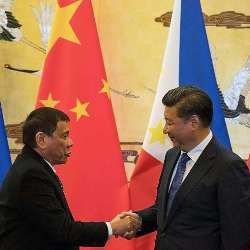China and Philippines to Strengthen Gambling Tourism Investments

Earlier this month, the President of the Philippines, Rodrigo Duterte, said openly that he would prefer to strengthen his country’s relationship with China instead of continuing to pursue a close relationship with the United States. Many people found this news to be shocking, but it’s a reflection of just what’s taking place in the Philippines today and where revenues in the country are being generated. And believe it or not, a lot of Duterte’s words stem from gambling.
Gambling Tourism Profitable
Since the crackdown on corruption in China has made Macau casinos less-than-desirable destinations for the country’s VIP high rollers, many Southeast Asian nations have seen an influx in Chinese tourists. The Philippines is no exception, and about 1 million Chinese tourists are expected to visit the Philippines this year, up from 490,841 the previous year.
For the Philippines, gambling tourism is profitable in a number of ways; tourists need hotel accommodation, they buy food; they shop; and they spend money at the casinos. Consequently, Filipino businesses benefit from increased revenues, while the Filipino government makes money from gambling taxes and on business revenues. It’s a win-win for everyone involved.
China Specific Orientation
Now, it seems that Chinese tourism may give the Filipino economy another boost. In October, a group of eight private Chinese investors visited Manila to meet with representatives from the Philippines Department of Tourism. The investors are looking to open travel agencies, large restaurants, charters and hotels in the Philippines, businesses that would be geared specifically toward offering services and amenities that would appeal to Chinese tourists.
After the meeting, Tourism Secretary Wanda Teo said that they believe they can increase the number of Chinese tourists greatly by strengthening their relationship with Chinese private investors. Specifically, Secretary Teo went on record saying that the country could hope to attract upwards of 2 million Chinese tourists every year. Commenting on the positive development between the two countries, Chinese Foreign Ministry spokesman Geng Shuang stated:
“High-level exchanges between the two countries are of great significance to enhancing mutual understanding, mutual trust and improving ties.”
Meanwhile, Chinese Ambassador to the Philippines Zhao Jianhua was even more poetical when expressing his view of the blossoming relationship between China and the Philippines, and explained:
“The clouds are fading away. The sun is rising over the horizon and will shine beautifully on the new chapter of bilateral relations.”
Business Opportunities for China
For the Chinese investors, investing in the Philippines is likely to be very profitable. During the meeting, representatives from the Department of Tourism outlined how investors could expect to receive favorable treatment in the Tourism Enterprise Zones established in the country. These zones were established to encourage the development of tourism-related business within key areas of the Philippines and provide businesses with tax-related benefits and other benefits. These areas have been established in Corregidor Island, Bataan, Bohol, Samal Island, San Vicente, and Palawan.
China and the Philippines are also working on a tourism partnership between the two nations. The agreement currently in the works would:
– Allow for networking and information sharing between tourism providers in both countries
– Require both countries to share financial tracking data related to tourism
– Set guidelines for safety and quality assurance for tourism businesses and services that would apply to companies operating in both countries
– Mandate that both countries promote tourism not just within their own borders but with the partner nation, encouraging tour operators and charters in their own countries to offer trips to China or the Philippines
US Alliance Put at Risk
In the meantime, Western diplomats have criticized Philippines President Rodrigo Duterte’s new detente with China as being strategically risky, especially as up until recently the country’s large Asian neighbor was seen as being one of its primary security threats. Duterte has even gone so far as to launch numerous tirades against the Philippines’ former colonial ruler, and after being denied an arms deal recently Duterte said that he might turn towards Russia and China instead. Commenting on the overall deteriorating situation, Gregory Poling from the Center for Strategic and International Studies, said:
“It’s a strange negotiating tactic unilaterally abandoning the only leverage he has over Beijing—the U.S. security umbrella.”








